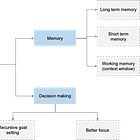Symposium #2: where everyone thinks everyone else is doing badly
Threads, Superalignment, An economy everyone loves to hate, More epidemics, Travel
Please treat this as an open thread! Do share whatever you’ve found interesting lately or been thinking about, or ask any questions you might have.
A older Strange Loop post that seems apt, considering the constant questions about
There is always a series of ongoing questions about how best we can teach people, and more recently teach machines, and it revolves around our belief regarding what we can teach directly and what requires more tacit knowledge. Which is especially fascinating when you apply it to nuclear physics.
1/ Twitter finds more competition as Meta launches Threads. I’m on there if you feel like saying hi.
I find it interesting that in the year 2023 we’re seeing an avalanche of new social media companies, after it was decisively called dead a couple of years ago. After Facebook came under Congressoinal investigation for effectively smothering a whole industry. And now, just for text, I have Twitter, Threads, Bluesky, Nostr, Mastodon, Post, Warpcast, Substack Notes, LinkedIn, and on top of this there’s Instagram and Tiktok and Snap.
This isn’t dying, this is vibrant!
It also shows a clear issue with all social media, at least the text based kind but applies to everything.
There is no escaping the iron laws of scaling. Once there are more people on the platform many will post things you don’t like or you don’t want (for all definitions of you) and there is no one solution to fix this.
There is an adversarial game being played by those who want to maximise their reach and the algorithm which wants people to “see information that isn’t manipulated”, and there is no winning here. A world where everyone posts what they want instead of what they think will get them clout is not our world, no matter how much we want it to be.
writes about this referencing status games, and it’s as close to a mimetic human law as exists.Your network is so so so hard to replicate! It’s the mother of all coordination problems to move your social graph over. But also its the easiest thing to start and have an insurance policy on. Because the value of the network is only in its users.
One thing’s for sure though, people smell blood in the water with Twitter. Mostly because Elon seems dead set on killing it by throttling links (which makes creators less likely to use it), placing rate limits (making regular users hate it, and lurkers, and advertisers), and gutting the guardrails that advertisers wanted in terms of appropriate speech.
2/ How to read the canon by
Henry’s amazing and you should read him, and here he talks about the importance of reading literature. Now, I am biased, in that I find reading pleasurable and don’t read if it isn’t, and somehow that maxim hasn’t been put off by “serious literature”, but two things stand out. One is that you should try to read the classics, read the canon, because the canon forms the underpinning for much of what gets written afterwards. Either as exposition or as an argument against.
The second is that you should stop reading or re-read books often> The way I think of it is that they are not consumption goods to finish in one sitting like a donut, but something to savour again and again and again.
A difference I have is that I think this applies also to non-literary books. I am an unabashed fan of Terry Pratchett and think his books contain wisdom like few others, but I also know many who are put off by his use of whimsy and odd, funny, fantasy settings. We all choose our red lines, just that some red lines are easier to create a Schelling point around.
Interesting throughout.
OpenAI announces it will create a team led by its leaders and put 20% of its compute towards the goal of creating ‘scalable methods’ to align eventual superintelligence. They have a timeline of 4 years.
Now, I’ve been critical repeatedly of this trend towards worrying without any real evidence regarding the issue, but nonetheless I think this is good. Mainly for the same reasons many folks are angry at it, which is that in order to achieve their goals of eventual superalignment the only path is to create an AGI that does it for us.
I would, once again though, reiterate a few things that would be good to see:
A definition of alignment that isn’t entirely tautological. Either it means “do what we want it to” in which case a bad actor could ask it to create a pocket nuke, or it means “don’t do bad things” in which case it could very well restrict us, and rightly so, from doing what we want.
A path from today to this superintelligence (essentially God). Right now there’s a lot of handwaving on how we get there, which is fine because the path is unclear. But if people are even somewhat convinced that this is coming, they need to show why they think that. Not just draw extrapolated lines, but have some real explanation.
If you want to see what I would like, it’s something like this:
4/ discusses how much pain is needed to “fix” the economy
I need to write a whole monetary policy explainer, but until then there is this problem with the economy. Which is that the tech sector is seeing wage losses and bankruptcies and forced sales and firings, but the rest of the economy is curiously fine. And since tech takes up such a large share of our imagination this makes people upset.
The economy is rigged, they argue. The media, being a tad obsessed with neat narratives of heroes and villains, talks about how everything sucks. But everything doesn’t suck anymore, which is odd.
Everyone is upset that things are bad for everyone else even though they themselves are doing fine.
Kyla talks about this problem, and the fundamental feeling of instability that seems to be our new normal. Great quotes throughout. An example:
There is a constant thread of instability and fear in most things we interact with, especially beyond just TV shows. Will Twitter die? Will TikTok? Will there be another pandemic? We have so many things to choose from, but there is no promise our choice will stay with us, and that creates a weird cognitive dissonance.
5/ Risks of more epidemics, this time with animals
So for many many industries turns out we use staggering numbers of animals. Not just the usual cows and chickens but there are also dog breeding, hunting, lifestock and petting zoos. And turns out despite the swine flue and bird flu and mad cow disease we don’t have a comprehensive strategy to mitigate the dangers from disease outbreaks amongst animals.
Zoonotic diseases, or those that spread from animals to humans, account for roughly 60 percent of all known infectious diseases and 75 percent of new and emerging ones, according to the Centers for Disease Control and Prevention.
…
The country produces more than 10 billion land animals for food every year, including more pigs and poultry, which can harbor and transmit influenza, than nearly any other country, Ms. Linder said. It is also the world’s leading importer of both livestock and wild animals, the report says. (More than 220 million live wild animals are imported annually.)
While we are (rightfully?) upset at the wet markets in Wuhan there are 130 live bird markets in the northeastern United States where 25 million birds “pass through”. Mostly the report suggests that we’re living in rather blissful ignorance, which might get undone at any moment.
Now, nobody likes epidemics I think, but the question is what’s the right way for us to create “biosecurity practices” to actively figure out plans to combat an outbreak if it happens. Much as I’d like a seamless way to identify hotspots and shut it down I also don’t know what the testing and information sharing apparatus has to look like for this to become feasible. It’s a good, and terrifying, question.
6/ The case against travel, by Agnes Callard
Wherein Agnes makes common cause with many Londoners and much of Paris by basically noting travel feels masturbatory and is done as signalling if nothing else, partially echoing
.The essay cites Chesterton and Socrates and Percy and Emerson and effortlessly weaves a narrative of how travel is not edifying, it alienates you from the natives, it doesn’t teach you anything because you’re busy ticking off boxes, and it doesn’t change the people who do travel in a sort of controlled experiment.
Whereas Percy and Emerson focus on the aesthetic, showing us how hard it is for travellers to have the sensory experiences that they seek, Pessoa and Chesterton are interested in the ethical. They study why travellers can’t truly connect to other human beings. During my Paris wanderings, I would stare at people, intently inspecting their clothing, their demeanor, their interactions. I was trying to see the Frenchness in the French people around me. This is not a way to make friends.
It’s well written and erudite, though like many essays written by philosophers shows the problems that philosophers face when traveling rather than anything intrinsic to travel itself. It cites a particular form of travel which feels like a caricature of a bad “American in Rome” sketch, or falls into the prey of asking “prove that travel mattered”. Much like doing philosophy, “prove that it matters” is probably the worst way to look at the activity.
I recommend reading it because it’s well written and fun. And then use it as an object lesson on why not to worry about immediate ROI when doing any activity, or indeed trying to force yourself into crafting a deeply thought, coherent, logically consistent reason to do anything.
7/ Disconfirmative Action by
What’s the link between affirmative action and the Bible, you might have wondered. Well, Zohar answers.
Moses knows he will die—he acknowledges his finitude—and prays for a successor. The priest who anoints Joshua, Elazar, is the father of Pinchas, bringing the parasha full circle: there is a link between Pinchas ben (son of) Elazar ben Aharon and Joshua ben Nun. Both are named as successors.
Much of mythology and much of our fables are actually succession questions when you think about it, whether it’s King Lear or the Lion King. It’s a surprisingly fruitful line of questioning, and who should be appointed is a hard question. Hell one of the longest running and bloodiest religious fights has its root in a succession question.
Which makes the question of how to appoint the right person harder than expected. You could use a metric, but those are gameable and might not correspond to what is needed. You could use judgement, but that can be debated. You could use a realpolitik view of who’s likely to win, but that’s a bit circular and prone to give rise to weird equilibria.
It’s good to see that the Bible isn’t immune to grappling with it at least. Maybe the Twitter board can catch a break.
8/ On cones and robots
This just made me giggle. Then it made me sad.
A decentralized group of safe streets activists in San Francisco realized they can disable Cruise and Waymo robotaxis by placing a traffic cone on a vehicle’s hood, and they’re encouraging others to do it, too.
This is the kind of thing where people will start rooting for the machines to run some people over. Just saying.







Pratchett is so good and the further you go in the series the more wisdom there is.
Totally agree about non literary books!